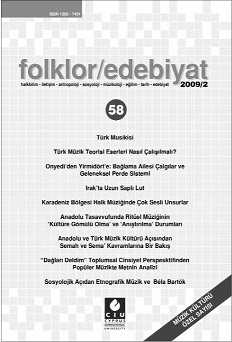Sosyolojik Açidan Etnografik Müzik ve Béla Bartók
Ethnographic Music and Béla Bartók From Sociological Point of View
Author(s): Dursun AyanSubject(s): Customs / Folklore, Music, Aesthetics, Ethnohistory, Social history, Cultural Anthropology / Ethnology, Sociology of Art, Ontology
Published by: Uluslararası Kıbrıs Üniversitesi
Keywords: Béla Bartók; Laszlo Rasonyi; Zoltan Kodaly; Turkish music; traditional music; ethnographic music; Turkish classical music; The Turkish Five; popular Turkish music; Yalçin Tura; Ali Ekber Çiçek; Kiraç;
Summary/Abstract: Even though the music could be product of a genius, the social and historical background that it came into existence within is as important as genius. Consequently, the interaction of tradition and music or traditional elements’ formation of theme and source for classical music which are issues of the day are not new. In the origins and evolution of classical music, traditional music has always been existent as a theme or style before Béla Bartók who is “the most modern of classical composers, the most classical of modern composers.” Hungarian composer Bartók is known for his interest in ethnographic music both as a composer and a researcher. He made folksong compilations in Osmaniye, Turkey in 1936 and emphasized the similarities between Hungarian folksongs and Turkish folksongs. Bartók who contributed to the formation of Western classical music comprehension in Turkey is an important figure for sociology of music. Another important aspect of him is about his efforts to understand the historical reality from musical materials. Turkish music brought up composers who produced works regarding universal polyphonic music with the melodies from their own culture despite that it did not experienced polyphony in European meaning with all its aspects. The importance of traditional music in personal developments of composers and in the evolution of classical music as an art prevents traditionalism- universalism paradox from being a surprising phenomenon in recent music life. Tradition exhibits itself both in compositions and in shorts songs which are written in Western style. Bartók evaluates his predecessors according to the utilization of traditional materials and emphasizes the difference of his style from others. In his compositions, the style of a systematical use of ethnical and traditional materials is a new design action. In this text, it is considered essential to mention that Bartók has an important place and avant-garde role in the development of postmodern discourse. Because, the constructing risks of the discourse that appeared in Turkey during 1980’s and sometimes transformed into a sophistry are not prevented. Recognizing the postmodern via politics is popular and risky. Instead of this, it would be more appropriate to recognize postmodern via music and architecture. The design action is important in arts as basic aesthetical and ontological element. Bartók handled folkloric music itself as a living fact instead of a dead material which is worthy of a museum and has been in a deep relationship with it. It should be stated that Bartók’s tendency to “use traditional music for classical music” is a living and dynamic state more than a didactic one. Today’s individual has a tendency to listen music required by the individual’s life style, regional and political ideology. This tendency results in an aesthetic eclipse and illusion. Every kind of contemporary tendency in music aims to become a legacy for future, in this context utilizing ethnical and traditional elements will render music free and original if it is not constrained by cultural and ideological conditionings. At the same time, confining traditional music elements for conservatism and filling them with ancient and commercial-touristic aims is a dangerous area. If musicianship may establish a relationship between tradition and modern, new channels will be developed between classical music and folksongs, lullabies and hymns which could be expressed as the everyday life that the individual is born in. Thus, the composer will be emancipated to express the owned musical preferences. Tending new synthesis and formations in music is a result of this kind of mentioned requirement.
Journal: Folklor/Edebiyat
- Issue Year: 15/2009
- Issue No: 58
- Page Range: 165-177
- Page Count: 13
- Language: Turkish

